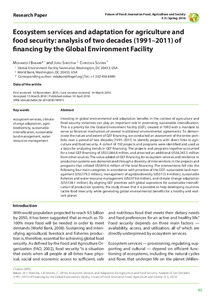| dc.date.accessioned | 2016-05-03T12:31:51Z | |
| dc.date.available | 2016-05-03T12:31:51Z | |
| dc.date.issued | 2016-04-10 | |
| dc.identifier.issn | 2197-411X | |
| dc.identifier.uri | urn:nbn:de:hebis:34-2016030749975 | |
| dc.identifier.uri | http://hdl.handle.net/123456789/2016030749975 | |
| dc.language.iso | eng | |
| dc.publisher | Department of Organic Food Quality and Food Culture at the University of Kassel, Germany and Federation of German Scientists (VDW) | eng |
| dc.rights | Urheberrechtlich geschützt | |
| dc.rights.uri | https://rightsstatements.org/page/InC/1.0/ | |
| dc.subject | ecosystem services | eng |
| dc.subject | climate change adaptation | eng |
| dc.subject | agrobiodiversity | eng |
| dc.subject | sustainable intensification | eng |
| dc.subject | sustainable land management | eng |
| dc.subject | water resources management | eng |
| dc.subject.ddc | 630 | |
| dc.title | Ecosystem services and adaptation for agriculture and food security: analysis of two decades (1991–2011) of financing by the Global Environment Facility | eng |
| dc.type | Aufsatz | |
| dcterms.abstract | Investing in global environmental and adaptation benefits in the context of agriculture and food security initiatives can play an important role in promoting sustainable intensification. This is a priority for the Global Environment Facility (GEF), created in 1992 with a mandate to serve as financial mechanism of several multilateral environmental agreements. To demonstrate the nature and extent of GEF financing, we conducted an assessment of the entire portfolio over a period of two decades (1991–2011) to identify projects with direct links to agriculture and food security. A cohort of 192 projects and programs were identified and used as a basis for analyzing trends in GEF financing. The projects and programs together accounted for a total GEF financing of US$1,086.8 million, and attracted an additional US$6,343.5 million from other sources. The value-added of GEF financing for ecosystem services and resilience in production systems was demonstrated through a diversity of interventions in the projects and programs that utilized US$810.6 million of the total financing. The interventions fall into the following four main categories in accordance with priorities of the GEF: sustainable land management (US$179.3 million), management of agrobiodiversity (US$113.4 million), sustainable fisheries and water resource management (US$379.8 million), and climate change adaptation (US$138.1 million). By aligning GEF priorities with global aspirations for sustainable intensification of production systems, the study shows that it is possible to help developing countries tackle food insecurity while generating global environmental benefits for a healthy and resilient planet. | eng |
| dcterms.accessRights | open access | |
| dcterms.bibliographicCitation | In: Future of Food: Journal on Food, Agriculture and Society. Witzenhausen : University of Kassel, Department of Organic Food Quality and Food Culture. - Vol. 4, No. 1 (2016), S. 40- 55 | |
| dcterms.creator | Bakarr, Mohamed | |
| dcterms.creator | Shrestha, Junu | |
| dcterms.creator | Severin, Christian | |

